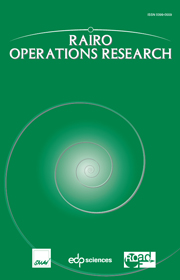Crossref Citations
This article has been cited by the following publications. This list is generated based on data provided by
Crossref.
Rekik, Monia
Cordeau, Jean-François
and
Soumis, François
2010.
Implicit shift scheduling with multiple breaks and work stretch duration restrictions.
Journal of Scheduling,
Vol. 13,
Issue. 1,
p.
49.
Saharidis, Georgios K. D.
Minoux, Michel
and
Ierapetritou, Marianthi G.
2010.
Accelerating Benders method using covering cut bundle generation.
International Transactions in Operational Research,
Vol. 17,
Issue. 2,
p.
221.
Pishvaee, M.S.
Razmi, J.
and
Torabi, S.A.
2014.
An accelerated Benders decomposition algorithm for sustainable supply chain network design under uncertainty: A case study of medical needle and syringe supply chain.
Transportation Research Part E: Logistics and Transportation Review,
Vol. 67,
Issue. ,
p.
14.
Sagnak, Muhittin
and
Kazancoglu, Yigit
2015.
Shift Scheduling with Fuzzy Logic: An Application with an Integer Programming Model.
Procedia Economics and Finance,
Vol. 26,
Issue. ,
p.
827.
Cuevas, Rodolfo
Ferrer, Juan-Carlos
Klapp, Mathias
and
Muñoz, Juan-Carlos
2016.
A mixed integer programming approach to multi-skilled workforce scheduling.
Journal of Scheduling,
Vol. 19,
Issue. 1,
p.
91.
Naderi, Mohammad Javad
and
Pishvaee, Mir Saman
2017.
A stochastic programming approach to integrated water supply and wastewater collection network design problem.
Computers & Chemical Engineering,
Vol. 104,
Issue. ,
p.
107.
Dahmen, Sana
Rekik, Monia
and
Soumis, François
2018.
An implicit model for multi-activity shift scheduling problems.
Journal of Scheduling,
Vol. 21,
Issue. 3,
p.
285.
Hur, Youngbum
Bard, Jonathan F.
Frey, Markus
and
Kiermaier, Ferdinand
2019.
A stochastic optimization approach to shift scheduling with breaks adjustments.
Computers & Operations Research,
Vol. 107,
Issue. ,
p.
127.
Prunet, Thibault
Absi, Nabil
Borodin, Valeria
and
Cattaruzza, Diego
2024.
Optimization of human-aware logistics and manufacturing systems: A comprehensive review of modeling approaches and applications.
EURO Journal on Transportation and Logistics,
Vol. 13,
Issue. ,
p.
100136.
Prunet, Thibault
Absi, Nabil
Borodin, Valeria
and
Cattaruzza, Diego
2024.
Optimization of human-aware logistics and manufacturing systems: A survey on the Human-Aware Models.
EURO Journal on Transportation and Logistics,
Vol. 13,
Issue. ,
p.
100137.


